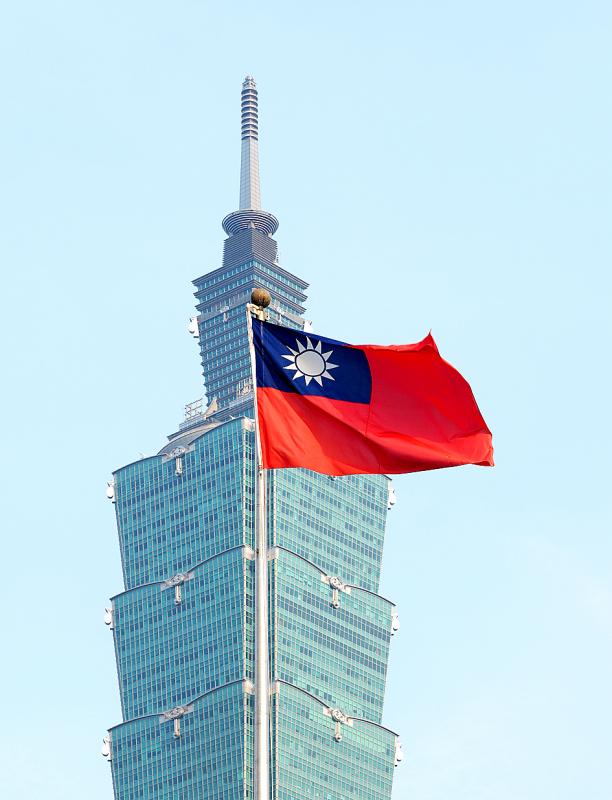Foreign direct investment (FDI) fell 18.24 percent to US$7.48 billion last year from a year earlier as COVID-19 spread worldwide, the Investment Commission said yesterday.
The number of approved applications from foreign investors fell 20.68 percent year-on-year to 2,711, it said.
Foreign investment is mainly in financial services and insurance, wholesale and retail trade, real-estate activities, information and communication technologies (ICT), and electronic parts and components manufacturing, the commission said.

Photo: David Chang, EPA-EFE
ICT saw the largest year-on-year increase in FDI inflows at 72.08 percent, while inflows to the real-estate industry grew by 38.03 percent year-on-year, it said.
The commission attributed the sharp decline in FDI to a continued worldwide rise in COVID-19 cases that affected foreign investors’ policies toward direct investment in Taiwan.
Nevertheless, Taiwan’s business environment remains attractive to foreign investors, the commission said, adding that it was optimistic that FDI inflows would increase once the global COVID-19 situation improves and cross-border restrictions ease.
Despite the drop in FDI last year, approved investments from countries listed in the government’s New Southbound Policy soared 162.32 percent from a year earlier to US$1.06 billion, with most of it coming from companies in Australia, Singapore and Thailand, the commission said.
The New Southbound Policy aims to enhance trade and exchanges between Taiwan and 18 countries in Southeast Asia, South Asia and Australia to reduce Taiwan’s dependence on China.
Last year, the value of investment applications from China approved by the government fell 7.97 percent to US$116.24 million from a year earlier.
The decline largely reflected changes in cross-strait ties, the US-China relationship, the volatile world economic situation and the government’s introduction of tightened regulations on Chinese investments, the commission said.
Since Taiwan lifted a ban on Chinese investment in June 2009, it has approved NT$2.53 billion (US$91.55 million) in funds from China.
Meanwhile, Taiwan’s approved foreign-bound investments rose 6.73 percent last year from a year earlier to US$1.26 billion, the commission said.
Last year, approved Taiwanese investments in China dropped by 0.73 percent from a year earlier to US$5.86 billion, it added.

In Italy’s storied gold-making hubs, jewelers are reworking their designs to trim gold content as they race to blunt the effect of record prices and appeal to shoppers watching their budgets. Gold prices hit a record high on Thursday, surging near US$5,600 an ounce, more than double a year ago as geopolitical concerns and jitters over trade pushed investors toward the safe-haven asset. The rally is putting undue pressure on small artisans as they face mounting demands from customers, including international brands, to produce cheaper items, from signature pieces to wedding rings, according to interviews with four independent jewelers in Italy’s main

Macronix International Co (旺宏), the world’s biggest NOR flash memory supplier, yesterday said it would spend NT$22 billion (US$699.1 million) on capacity expansion this year to increase its production of mid-to-low-density memory chips as the world’s major memorychip suppliers are phasing out the market. The company said its planned capital expenditures are about 11 times higher than the NT$1.8 billion it spent on new facilities and equipment last year. A majority of this year’s outlay would be allocated to step up capacity of multi-level cell (MLC) NAND flash memory chips, which are used in embedded multimedia cards (eMMC), a managed

Japanese Prime Minister Sanae Takaichi has talked up the benefits of a weaker yen in a campaign speech, adopting a tone at odds with her finance ministry, which has refused to rule out any options to counter excessive foreign exchange volatility. Takaichi later softened her stance, saying she did not have a preference for the yen’s direction. “People say the weak yen is bad right now, but for export industries, it’s a major opportunity,” Takaichi said on Saturday at a rally for Liberal Democratic Party candidate Daishiro Yamagiwa in Kanagawa Prefecture ahead of a snap election on Sunday. “Whether it’s selling food or

In the wake of strong global demand for AI applications, Taiwan’s export-oriented economy accelerated with the composite index of economic indicators flashing the first “red” light in December for one year, indicating the economy is in booming mode, the National Development Council (NDC) said yesterday. Moreover, the index of leading indicators, which gauges the potential state of the economy over the next six months, also moved higher in December amid growing optimism over the outlook, the NDC said. In December, the index of economic indicators rose one point from a month earlier to 38, at the lower end of the “red” light.